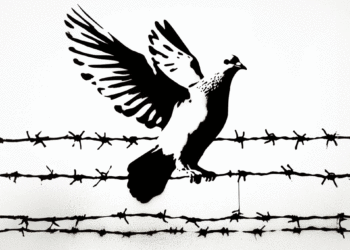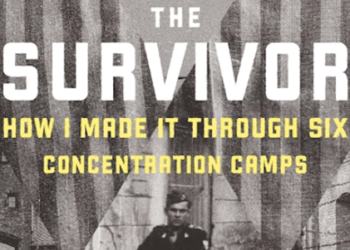A holiday that emphasizes our transitory existence leads to reflections on how we’ll survive on this climate-challenged planet
By MARTIN WESTERMAN
As Americans repeat their centuries-old folly of inflaming anti-immigrant passions, we might remind ourselves that the Torah commands us 36 separate times to love or provide for the stranger. That’s more than the number of mitzvot for Shabbat, sacrifices, Yom Kippur or kashrut.
Jewish on Earth
It’s a good idea to recall this Torah commandment at Sukkot, when it’s a mitzva to invite families, friends, neighbors and even sukka-less strangers to our booths. We were strangers once in the Land of Egypt, and God, Moses and our rabbinic sages apparently don’t want us making the same mistakes with strangers that the ancient Egyptians made with us.
Torah commandments are made to set ideals for us. We’re fear- and scarcity-driven animals, whose intellects (cerebral cortex) are constantly wrestling with our fight-or-flight lizard brains (amygdala). This leads us often to act irrationally. But our intellects are determined and persistent, and over the millennia, they’ve led us past superstition and brutality to wiser places.
For example, we don’t pronounce death sentences on recalcitrant sons (Ki Tetze), or on people who plant two different crops in the same field, wear”¨ garments made from two different kinds of thread (Lev.19:19), or violate the Sabbath. We no longer kill or banish men for trimming their hair (Lev. 19:27), or trading clothes with women (Ki Tetze). And we don’t keep slaves (Lev. 25:44), or sell our daughters into slavery (Exodus 21:7). But as genetic research advances, we pursue justice, exercise kindness to strangers, and increasingly view these relationships as unremarkable; intellect may lead us past this “hot button issue,” as it did with earlier ones. It’s a good thing: we need to focus on how we’ll survive on this climate-challenged planet.
The key to survival is reimagining our social contract. It’s the invitation behind every commandment in the Torah: How can we choose to better relate to and work with each other? Currently, we see everything in economic terms, as in, “It’s the economy, stupid!” But it’s really the people in each economy who create the impacts on our planet. People are the bottom line. Until recently, economists magically separated the economy from its social and ecological consequences, rejecting them as “externalities” with no bearing on business. Now, we know better. Our new perspective, “sustainable business,” promotes a “triple bottom line” of equity, ecology and economy.
It is possible in business — as Starbucks, Nike, 3M, Costco, REI, Patagonia and hundreds of other companies have shown — to treat people well, and reduce environmental impacts. But to be a sustainable business, a firm must stay in business. And even though societal responsibilities are spelled out in every corporation’s charter, profit concerns still trump people and planet for most of them. Businesses are also hampered by their size: the more national or global the enterprise, the less its owners, executives and managers connect with local, social and environmental consequences. But the more local and regional the business, the more it connects with people and planet. Do you see a pattern here?
One way to reimagine the social contract is by “voting with your dollars.” This supports local and regional enterprises that take good care of the people and places where they do business. We’re bound in Judaism to pursue justice and do mitzvot. What are the incentives for such good behavior? Potentially, more civic engagement, less pollution and illness, better uses of resources, more jobs, more local investment. In short, better lives for us all.
Another way to help reimagine, and engage in, the social contract is by joining the tikkun olam or social action committee at your synagogue. Other opportunities are posted by the Reform, Reconstructionist, Conservative and Orthodox movements. They have all initiated offices or resource centers to promote earth-healing actions. Several independent Jewish organizations also promote them.
Consider contributing time and/or dollars to:
• American Jewish World Service, dedicated to alleviating poverty, hunger and disease among people across the globe;
• COEJL, the Coalition on the Environment and Jewish Life, which creates distinctively Jewish responses to the environmental crisis;
• Hazon, working to create a healthier and more sustainable Jewish community and world for all; and
• Repair the World, working to make service to those in need a defining part of American Jewish life.
The sukka’s eye view makes the world seem simple and clear. To paraphrase the Shema and Ki Tavo: be kind to the earth, and it will be kind to you. You are the key — and how kind you are to others.
***
Martin Westerman writes his “Jewish on Earth” environmental columns from Seattle, Wash.
(American Jewish World, 9.17.10)




















